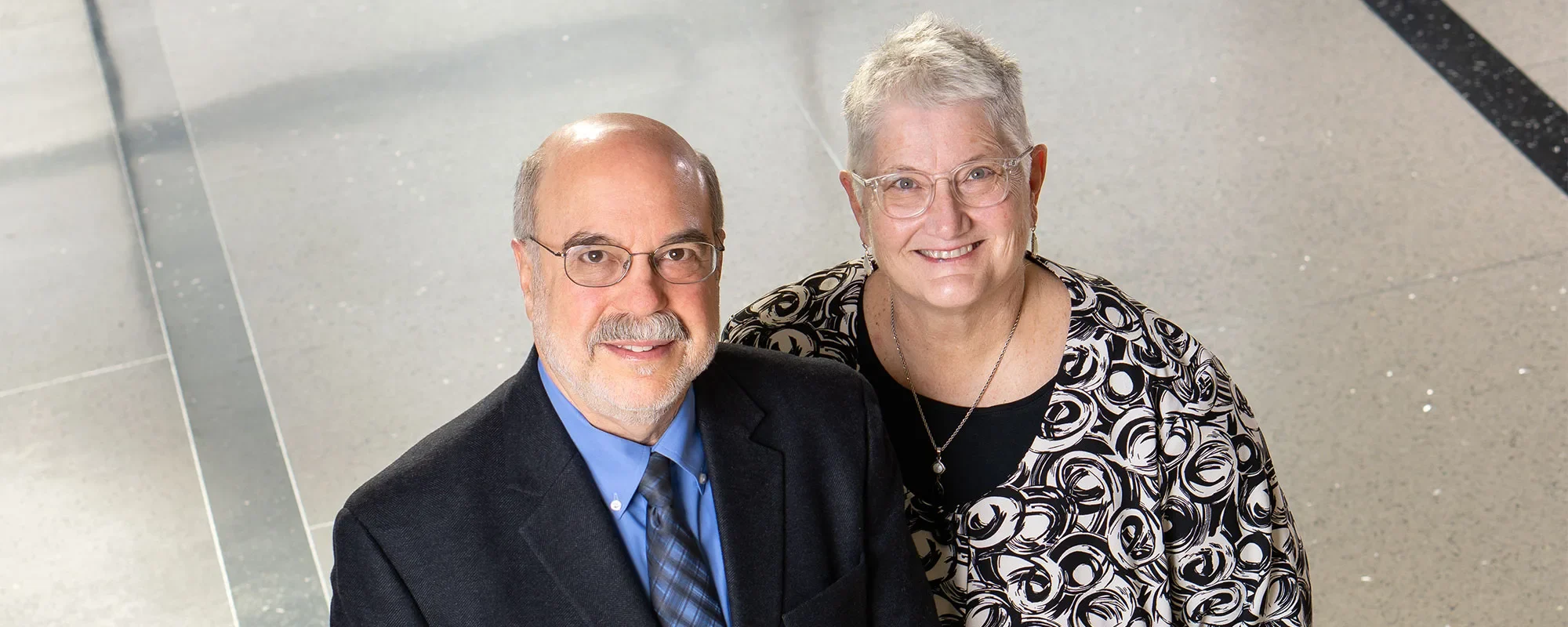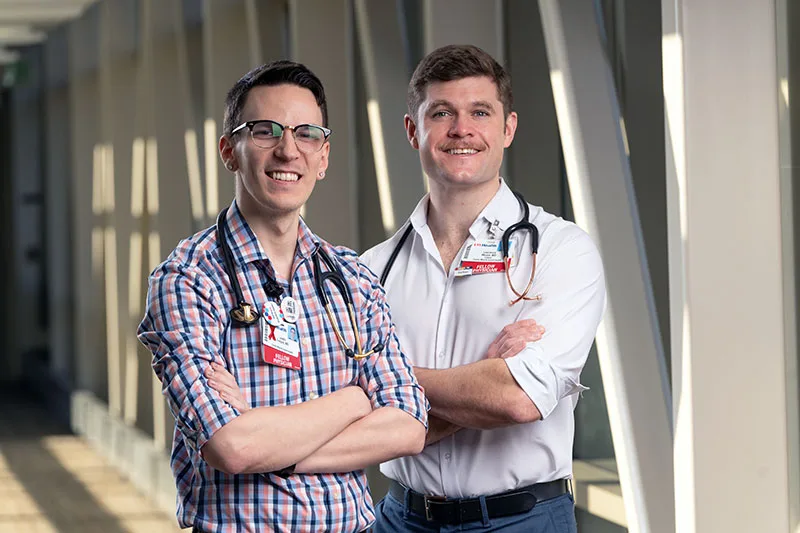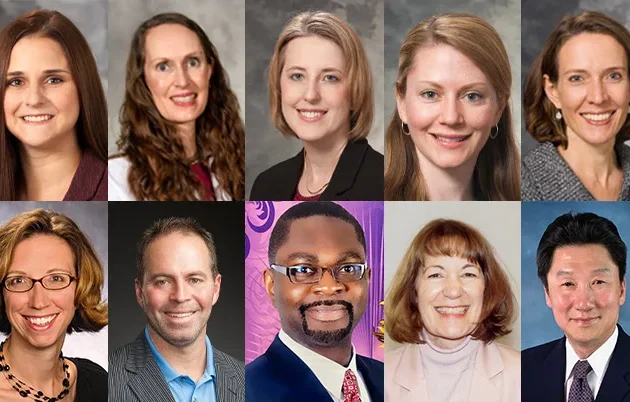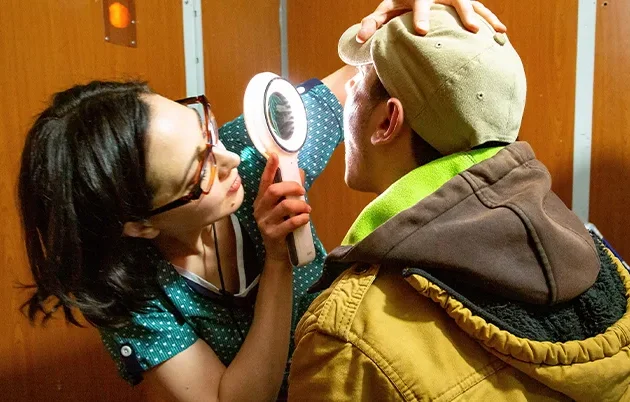Training for LGBTQ+ Care

It is no secret that individuals who identify as LGBTQ+ have been disproportionately and negatively impacted relevant to their physical health and emotional well-being. Addressing these disparities is a herculean task, but the University of Wisconsin School of Medicine and Public Health (SMPH) is actively taking on the challenge.
In 2021, the American Medical Association Foundation (AMAF) selected SMPH as the inaugural recipient of the foundation’s National LGBTQ+ Fellowship Program. Chosen from a pool of 52 applicant institutions, SMPH received a four-year grant from the AMAF to launch a year of program development and recruitment, then three consecutive years of one-year LGBTQ+ Health Fellowships. The school’s first cohort of two fellows graduated in June 2023; one now practices in Washington, DC, and the other in Sacramento, California.
The AMAF launched the LGBTQ+ Fellowship Program to begin transforming the landscape of medical education for the better.
“Most medical schools lack LGBTQ+ standards of care or teaching models, and the time was long overdue to address this void,” says AMA Foundation Executive Director Ginger Spitzer. “The University of Wisconsin proposal stood out by focusing on how it could help advance the field of LGBTQ medical education and clinical care, globally speaking. They led with how they could help make a significant impact in patient care and worked backward from there.”
Moreover, Spitzer says, while being housed in SMPH’s Department of Family Medicine and Community Health (DFMCH), the school’s proposal was a standout in its multidisciplinary approach, ensuring interdepartmental involvement.
Elizabeth Petty, MD ’86 (PG ’89), senior associate dean for academic affairs at SMPH and co-director of the fellowship, recalls the moment that inspired her to pursue the grant once the request for proposals came out.
“The UW School of Nursing hosted an online summit on LGBTQ health a couple of years ago,” Petty recalls. “A trans person from northern Wisconsin described how ostracized they felt from their family and community. They felt isolated. Along with other participants in the workshop, I was moved by their story. It convinced me that we, as a school, could not let the opportunity to build more education about affirming care slip away.”
A Multi-Department Commitment
The four-year AMAF funding supports one LGBTQ+ health fellow per year at SMPH, and additional financial support from several of the school’s clinical departments has enabled it to fund a second fellow in each of the first two cohorts.
“Leaders in the DFMCH, Department of Pediatrics, and Department of Medicine were instrumental in helping us construct a robust curriculum for the fellowship, which is focused on primary care,” says William Schwab, MD, the program’s co-director and former interim chair of the DFMCH. “The goal is for our graduates to leave with outstanding clinical skills, as well as a passion for advocacy when it comes to improving health outcomes for those affected by HIV and other conditions that disproportionately impact the LGBTQ community, including the need for gender-affirming services.”
This training opportunity is urgently needed and all too scarce among institutions of medical education, says Justin Temple, MD (PG ’23), who earned his medical degree from the University of Illinois at Chicago and completed a family medicine residency in SMPH’s DFMCH before becoming one of two 2023-24 fellows in the LGBTQ+ Health Fellowship.

“I’m so grateful to the UW School of Medicine and Public Health for going after this and investing the time, space, and energy that went into securing the funding,” says Temple, a native of the Chicago area who hopes to eventually practice in the Midwest where he can specialize in caring for patients with HIV and those considering gender-affirming care.
“Not long ago,” Temple says, “I saw a patient who identifies as nonbinary who was thinking of taking gender-affirming hormones. We talked through the possibilities, and as we finished our conversation, the patient decided not to pursue treatment at that time. The patient got choked up with emotion simply because there was an opportunity to have this discussion in a supportive medical environment. That confirmed for me how powerful this kind of education can be both for the patient and myself as the clinician.”
A Rare Beacon of Light for Patients
Laurence Moore, MD, MPH, the other 2023–24 LGBTQ+ health fellow, also has experienced several indelible moments during his time in Madison.
“I’m not from here, so when I meet with a teenage patient and their family, I often Google their hometown to see how far they’ve traveled,” Moore says. “Seeing how many patients come to Madison from three, four, or five hours away to see me for 45 minutes, it just amazes me. There is simply no other place to go for the services we provide. This reinforces what a true privilege it is to offer this kind of care.”
Moore completed his master of public health degree at the University of California, Berkeley, and his medical degree at the Oregon Health and Science University in Portland. He practiced at a low-cost health care clinic in Palm Springs, California, before coming to Madison, and he hopes to return to the west coast once he completes his fellowship.
Petty and Schwab acknowledge that graduating two fellows per year will not erase the myriad health care inequities that adversely impact the LGBTQ+ community, such as higher-than-average rates of depression and anxiety; a higher risk for HIV; and greater incidences of several forms of cancer. Still, they say the program makes it possible for its graduates to serve as role models and thought leaders when it comes to improving medical care for so many people whose unique concerns have historically been neglected. They are deeply grateful for the strong support from SMPH and UW Health leaders, as well as campus and community partners.
“As a member of the LGBTQ+ community,” Petty says, “I know individuals have felt harassed, discriminated against, and marginalized by not having their health concerns taken seriously. Thanks to the American Medical Association Foundation’s support, we are enabling physicians like Drs. Temple and Moore to start moving the needle in the right direction, not only for the LGBTQ+ population, but for the entire field of medical education.”

